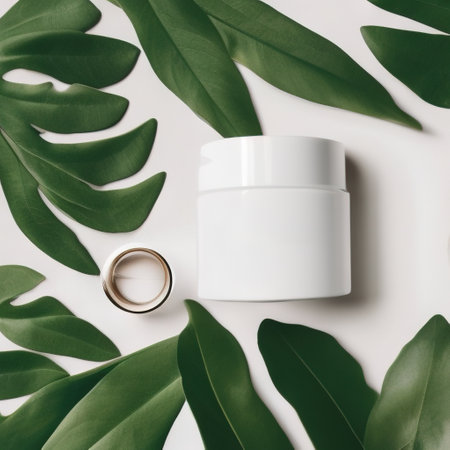Introduction: The Shift Towards Sustainable Beauty
Over the past decade, the UK beauty industry has witnessed a profound transformation driven by a heightened awareness of environmental responsibility. British consumers are increasingly aligning their purchasing decisions with eco-conscious values, demanding transparency, ethical sourcing, and minimal environmental impact from their favourite beauty brands. This growing emphasis on sustainability is not merely a trend, but a paradigm shift that is reshaping the aesthetics market across the nation. As more individuals seek products that are both effective and environmentally responsible, established brands and indie newcomers alike are re-evaluating their formulations, packaging, and business models to meet this new standard. The move towards sustainable beauty reflects a broader societal push for greener lifestyles and underlines the UK’s commitment to leading global conversations on climate action within the cosmetics sector.
2. Defining Sustainable Beauty Within the UK Context
Sustainable beauty, while globally recognised, takes on unique nuances within the UK market. For British consumers and brands, sustainability extends beyond mere eco-friendly packaging or cruelty-free claims—it encompasses a holistic approach that addresses environmental impact, ethical sourcing, social responsibility, and transparency throughout the entire product lifecycle.
Understanding Sustainability for UK Consumers
UK consumers are increasingly discerning, demanding more than just green marketing slogans. According to recent studies, British shoppers value authenticity and traceability in their beauty products. This means brands must not only reduce plastic usage but also ensure ingredients are ethically sourced, supply chains are transparent, and production processes minimise carbon footprint. Local definitions of sustainable beauty often include:
| Factor | UK Consumer Expectation |
|---|---|
| Packaging | Recyclable, biodegradable, or refillable options |
| Ingredients | Naturally derived, organic, non-toxic, locally sourced where possible |
| Cruelty-Free Status | No animal testing at any stage of development or production |
| Brand Transparency | Clear labelling of origin and production practices |
| Social Impact | Fair labour practices and community support initiatives |
The Influences Shaping Ethical Beauty Choices in the UK
A range of factors drive ethical beauty preferences among UK consumers. Key influencers include heightened awareness of climate change, government regulations on plastic waste, media coverage on unethical sourcing practices, and the rise of social media advocacy for clean beauty. The shift is further propelled by a younger generation—especially Millennials and Gen Z—who are more likely to research brand values before purchasing.
Local Legislation and Industry Standards
The UK has implemented stringent regulations regarding cosmetics safety and environmental claims. Brands operating in this market must comply with standards set by bodies such as the Soil Association (for organic certification) and adhere to post-Brexit updates to cosmetic ingredient lists. These legal frameworks shape how sustainability is defined and communicated to consumers.
Towards a Shared Definition of Sustainability in UK Beauty
Ultimately, sustainable beauty in the UK is characterised by a balance between environmental stewardship, social responsibility, and economic viability. Both brands and consumers are moving towards a shared understanding that genuine sustainability must be embedded into every aspect of the aesthetics value chain—from ingredient sourcing to end-of-life disposal—reflecting not just a trend but an evolving standard within the British beauty industry.
![]()
3. Innovative Practices and Eco-Friendly Ingredients
As sustainability becomes central to the UK beauty industrys ethos, British brands are leading the way with innovative practices that prioritise both environmental responsibility and consumer wellbeing.
Sustainable Sourcing: From Field to Face
Many UK-based companies have embraced transparent supply chains, sourcing ingredients responsibly from local growers or certified sustainable farms. This not only reduces carbon footprints by minimising transport but also supports British agriculture and ensures traceability throughout the production process.
Cruelty-Free Testing: A New Standard
The movement towards cruelty-free testing has gained substantial momentum across the UK. Brands are increasingly rejecting animal testing in favour of alternative scientific methods, aligning with both EU regulations and the ethical values of British consumers. The widespread adoption of Leaping Bunny certification is a testament to this commitment, reinforcing trust and loyalty among eco-conscious shoppers.
Biodegradable Packaging: Rethinking Waste
With packaging waste a major concern in the cosmetics sector, forward-thinking UK beauty labels are investing in biodegradable materials, such as plant-based plastics, recycled paper, and compostable cellulose. These choices reflect a broader commitment to reducing landfill contributions and closing the loop on product lifecycles.
Natural Ingredients: Back to Botanical Basics
The demand for natural formulations has encouraged British brands to innovate with botanicals native to the UK, such as elderflower, nettle, and sea buckthorn. By harnessing these ingredients, companies not only offer unique, effective products but also minimise reliance on synthetic chemicals that can harm ecosystems.
Paving the Way for Industry Transformation
In sum, the integration of sustainable sourcing, cruelty-free commitments, biodegradable packaging, and natural ingredients is redefining expectations for beauty products in the UK. These pioneering efforts set a benchmark for global markets and signal a future where sustainability is synonymous with quality and innovation.
4. Major Players and Indie Disruptors
The sustainable beauty movement in the UK is being propelled by a dynamic mix of established brands and innovative independent labels. These pioneers are not only transforming their own operations to meet eco-friendly standards but are also shaping consumer expectations and industry benchmarks across the aesthetics market.
Leading the Charge: Established UK Brands
Several household names have taken decisive action towards sustainable practices, leveraging their influence to mainstream green beauty. For instance, The Body Shop continues to champion ethical sourcing and refillable packaging, while Neal’s Yard Remedies stands out for its organic certifications and commitment to carbon neutrality. These brands invest heavily in transparent supply chains and circular economy principles, thereby setting a gold standard for others to follow.
Indie Innovators: Shaping Tomorrow’s Trends
The indie segment is particularly vibrant, with emerging labels rapidly gaining traction among environmentally conscious Britons. Brands like UpCircle Beauty have carved a niche by repurposing food waste into skincare products, demonstrating innovation at the intersection of sustainability and efficacy. Meanwhile, BYBI Beauty leverages low-carbon production methods and plant-based ingredients, appealing to millennials and Gen Z consumers seeking transparency and authenticity.
Comparative Snapshot: Key UK Sustainable Beauty Players
| Brand | Key Innovation | Sustainability Focus |
|---|---|---|
| The Body Shop | Refill stations, community trade sourcing | Ethical sourcing, recyclable packaging |
| Neal’s Yard Remedies | Certified organic skincare | Carbon neutrality, organic farming |
| UpCircle Beauty | Repurposed coffee grounds skincare | Circular economy, zero-waste ethos |
| BYBI Beauty | Plant-based, low-carbon formulas | Sustainable packaging, ingredient transparency |
Setting New Standards in the Marketplace
The collective efforts of these major players and indie disruptors have had a ripple effect throughout the UK beauty sector. Their proactive approach to sustainability not only aligns with evolving regulatory frameworks but also cultivates a culture where consumers expect both environmental responsibility and product performance as standard. As these trailblazers continue to innovate—through biodegradable materials, closed-loop systems, or community-driven initiatives—they redefine what it means to be beautiful in Britain’s modern marketplace.
5. Challenges and Opportunities in the Green Transition
The shift towards sustainability within the UK beauty sector is gaining momentum, but the journey is not without its hurdles. As eco-conscious brands reshape the market, they face a complex regulatory landscape, significant cost implications, and a rapidly evolving competitive environment that brings both challenges and new avenues for growth.
Regulatory Hurdles
UK regulations around sustainability in beauty are becoming increasingly stringent, particularly post-Brexit as domestic standards diverge from EU frameworks. Brands must navigate evolving rules on ingredient sourcing, packaging recyclability, and environmental claims. Compliance requires rigorous documentation and transparency—failure to adhere can result in reputational damage or legal repercussions. Many SMEs find the administrative burden substantial, often lacking the resources to keep pace with larger multinationals.
The Cost of Sustainable Beauty
Switching to eco-friendly materials and ethical supply chains typically drives up operational costs. Biodegradable packaging, fair trade ingredients, and carbon-neutral logistics come at a premium. While many UK consumers are willing to pay extra for genuinely sustainable products, the price sensitivity remains a concern, especially during economic uncertainty. Brands must strike a careful balance between maintaining profitability and delivering on their green promises.
Emerging Business Opportunities
Despite these obstacles, the pivot towards sustainability opens up innovative business models and market segments. British brands leveraging circular economy principles—such as refill schemes or upcycled ingredients—are capturing consumer attention and fostering loyalty. The demand for transparency has also spurred digital solutions: blockchain tracking for ingredient provenance and AI-driven lifecycle analysis are gaining traction among tech-savvy UK shoppers. Furthermore, partnerships with local suppliers not only reduce environmental impact but also resonate with the growing buy British sentiment.
A Platform for Leadership
The green transition presents an opportunity for UK beauty brands to lead on the global stage by setting new benchmarks in sustainability. Those who embrace collaboration—working closely with regulators, innovators, and consumers—will be best positioned to thrive in this dynamic market.
6. Consumer Behaviour and Market Impact
The sustainable beauty movement is markedly influencing consumer behaviour across the UK, shaping not only what products people buy but also how they perceive brands within the aesthetics market. As eco-consciousness becomes increasingly mainstream, British consumers are scrutinising ingredients, packaging, and supply chains with a discerning eye. This shift is particularly notable among Millennials and Gen Z, who are driving demand for transparency and ethical practices. According to recent market data, over 60% of UK shoppers now state that sustainability credentials factor into their purchasing decisions, often prioritising brands that demonstrate genuine environmental commitment.
Purchasing Decisions: From Trend to Expectation
Gone are the days when sustainability was a niche preference; it has now become an expectation. Eco-conscious consumers in the UK actively seek out beauty products that align with their values—whether thats cruelty-free formulations, recyclable packaging, or locally sourced ingredients. This behavioural change is not merely anecdotal but reflected in rising sales figures for sustainable beauty brands. Retailers have responded by expanding their green offerings and introducing dedicated sections for environmentally friendly products, further reinforcing these purchasing patterns.
Brand Loyalty in a Sustainable Era
Brand loyalty within the UK aesthetics sector is increasingly tied to perceived authenticity around sustainability. Consumers are quick to reward companies that lead with purpose-driven initiatives while penalising those accused of greenwashing or insincerity. Brands that consistently communicate their sustainability journey through transparent labelling, certifications, and storytelling cultivate deeper trust and customer retention. Initiatives such as refill schemes, carbon-neutral pledges, and community-driven projects resonate especially well with the British public, fostering long-term loyalty and advocacy.
Reshaping the Aesthetics Industry
The cumulative impact of these behavioural shifts is profound. The rise of eco-conscious beauty has compelled both indie disruptors and heritage brands to rethink product development, marketing strategies, and corporate responsibility frameworks. The UK aesthetics industry is rapidly evolving into a more circular and regenerative model—one where innovation is measured not just by efficacy but also by environmental stewardship. In this climate, brands that successfully integrate sustainability into their DNA are better positioned to capture market share, set new standards, and shape the future of British beauty.

